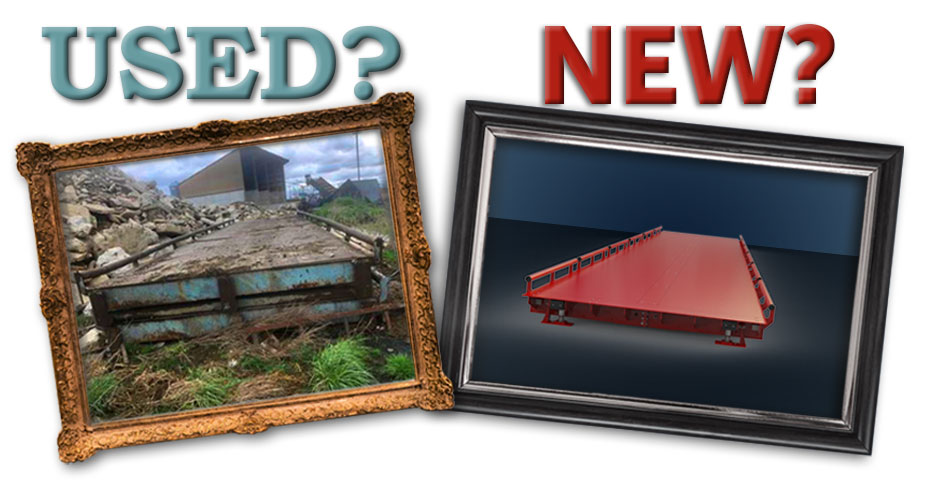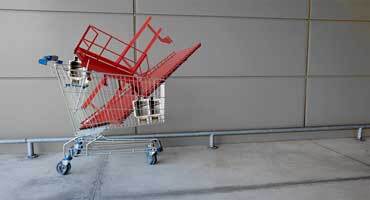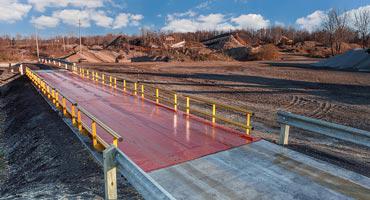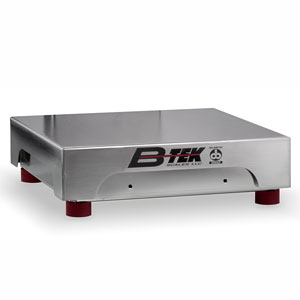The B-TEK Learning Center
Resources to help you scale your business with B-TEK.

When buying a used truck scale, you want to ensure you get the best deal. Learn what you should be looking for when purchasing a used truck scale.
When buying a used truck scale, you want to ensure you get the best deal. Learn what you should be looking for when purchasing a used truck scale.
When you're in the market for a used truck scale, you surely ask yourself, “is this really the right way to go?" Many people before you have gone this route only to pay significantly more money to repair the scale and replace components that weren't covered under warranty. Others, usually people that run very few trucks a day, have ended up just fine! We will explore the main items to look for so you can make an informed decision and feel confident about your choice before you make your bid at that auction.
While our focus will be truck scales specifically, many of the following points also apply to axle scales, portable truck scales, low profile floor scales, pit-type scales, or wheel weighers. These factors can also apply to any size scale from a 10 ft x 10 ft portable scale to the largest NTEP Legal-For-Trade certified industrial scale.

Transporting the Truck Scale
One of the first considerations is if the used vehicle scale has a concrete deck or a steel deck. Since the concrete deck truck scale is much heavier a much larger crane will be needed for removal and scale installation causing a significant increase in cost. You will also incur significantly higher shipping costs. Concrete decks may take 3 to 4 trucks to move to a new location! For the most part, a steel deck truck scale is a more portable scale and can be stacked on one flatbed without needing a special crane.
Condition of Scale
The next consideration is the condition of the used scale. There are some questions that can assist in determining the current condition:
What is the age of the truck scale?
The older the scale, the more trucks have driven over it, applying stress not only to the ramps and I-beams on the weighbridge but even to the areas that you can't visibly see. A scale's original Concentrated Load Capacity (CLC) doesn't automatically account for wear-and-tear, and it's probable that, after years of use, the same scale might not be able to attain the same CLC rating.
How do the welds look?
Look for any cracks in the welds or separation between the beams and the deck. Unless you are able to weld in the field, stay away from a scale with broken welds!
Is there tire wear on the deck?
Ruts in the tire path from decades of truck weighing are not able to be repaired and will never improve. These ruts can also signify that the lb. capacity of the weighing scale was regularly exceeded or perhaps there was more heavy-duty truck traffic than the scale was intended to see.
Is there any rust?
Much like ruts in the steel, rust is never going to improve with time. If you are putting this industrial scale in the snow and ice or in a saltwater environment, then you need to consider the aggregate corrosion that an already rusted scale will see.

Can you locate the manufacturer of the truck scale for foundation drawings?
Make sure the manufacturer is still in business so you can get parts and information you need to pour a proper foundation. Scale and foundation drawings are invaluable when installing a used truck scale.
Example drawings:
Condition of Load Cells and other Components
Is the truck scale currently operational? If not, plan on spending significant money to replace components and add other electronics that may have been lost or damaged in storage.
Not sure if the scale has all the components? We have listed the main components of a truck scale that are necessary for the truck scale to operate.
Parts to look for that would go with the Truck Scale
- Load Cells
- Load Cell Cables
- Junction box
- Instrumentation (The Indicator)
- LED Signs
- Remote display
- Ticket printer
Warranties
Warranties on truck scales are typically transferable as long as the required maintenance has been upheld from owner to owner. If the used truck scale is (5) years old or older you should probably plan on the warranty no longer being intact. This means paying out of pocket for all cabling, load cells, indicators, and anything else that can go wrong. You should also consider that an older truck scale without newer, digital load cells is more susceptible to lightning and power surges. These are events that should be covered under the warranty period but are very costly both in replacing components and in downtime for your company should they not be covered.
Should You Buy a Used Truck Scale?
Overall, if you are running a lighter operation with less than (30) trucks per day and you are comfortable with the history of the used scale you are looking at, a used scale might be a good fit for your truck weighing operation. If the scale looks good, is fully functional, and was manufactured by a reputable company, that used scale is something that should be considered.
If you need any help in your scale purchase, used or new, please contact us here at B-TEK. We're happy to answer any questions you have about finding replacement parts, the installation process, calibration, or any other technical issues that may arise.








